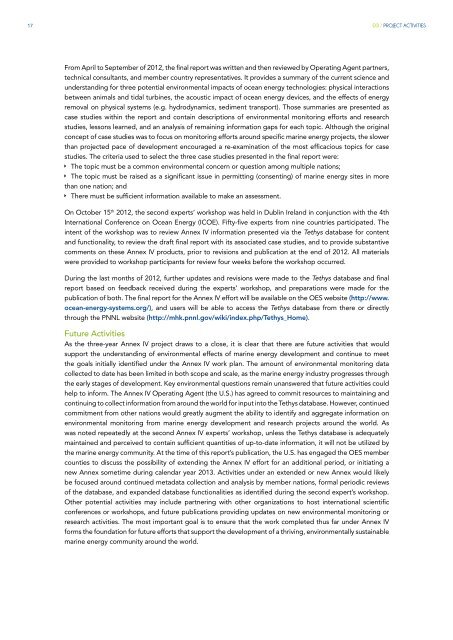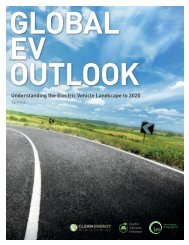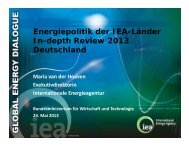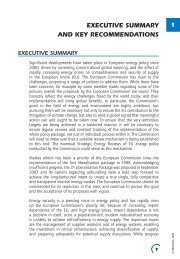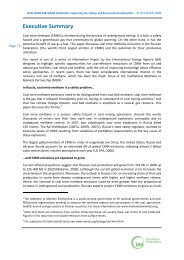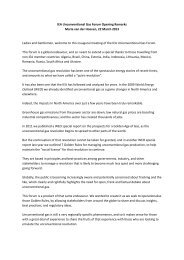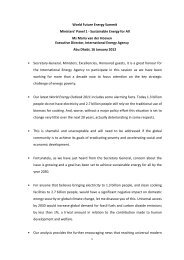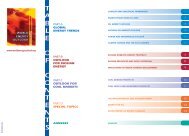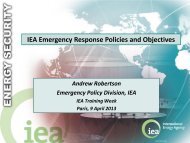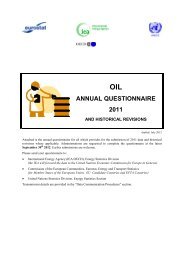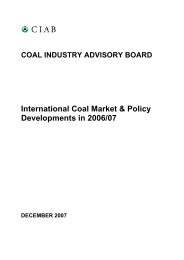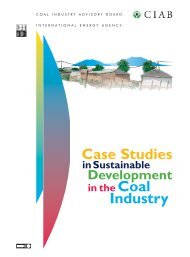OES Annual Report 2012 - Ocean Energy Systems
OES Annual Report 2012 - Ocean Energy Systems
OES Annual Report 2012 - Ocean Energy Systems
You also want an ePaper? Increase the reach of your titles
YUMPU automatically turns print PDFs into web optimized ePapers that Google loves.
17<br />
03 / PROJECT ACTIVITIES<br />
From April to September of <strong>2012</strong>, the final report was written and then reviewed by Operating Agent partners,<br />
technical consultants, and member country representatives. It provides a summary of the current science and<br />
understanding for three potential environmental impacts of ocean energy technologies: physical interactions<br />
between animals and tidal turbines, the acoustic impact of ocean energy devices, and the effects of energy<br />
removal on physical systems (e.g. hydrodynamics, sediment transport). Those summaries are presented as<br />
case studies within the report and contain descriptions of environmental monitoring efforts and research<br />
studies, lessons learned, and an analysis of remaining information gaps for each topic. Although the original<br />
concept of case studies was to focus on monitoring efforts around specific marine energy projects, the slower<br />
than projected pace of development encouraged a re-examination of the most efficacious topics for case<br />
studies. The criteria used to select the three case studies presented in the final report were:<br />
ÌÌ<br />
The topic must be a common environmental concern or question among multiple nations;<br />
ÌÌ<br />
The topic must be raised as a significant issue in permitting (consenting) of marine energy sites in more<br />
than one nation; and<br />
ÌÌ<br />
There must be sufficient information available to make an assessment.<br />
On October 15 th <strong>2012</strong>, the second experts’ workshop was held in Dublin Ireland in conjunction with the 4th<br />
International Conference on <strong>Ocean</strong> <strong>Energy</strong> (ICOE). Fifty-five experts from nine countries participated. The<br />
intent of the workshop was to review Annex IV information presented via the Tethys database for content<br />
and functionality, to review the draft final report with its associated case studies, and to provide substantive<br />
comments on these Annex IV products, prior to revisions and publication at the end of <strong>2012</strong>. All materials<br />
were provided to workshop participants for review four weeks before the workshop occurred.<br />
During the last months of <strong>2012</strong>, further updates and revisions were made to the Tethys database and final<br />
report based on feedback received during the experts’ workshop, and preparations were made for the<br />
publication of both. The final report for the Annex IV effort will be available on the <strong>OES</strong> website (http://www.<br />
ocean-energy-systems.org/), and users will be able to access the Tethys database from there or directly<br />
through the PNNL website (http://mhk.pnnl.gov/wiki/index.php/Tethys_Home).<br />
Future Activities<br />
As the three-year Annex IV project draws to a close, it is clear that there are future activities that would<br />
support the understanding of environmental effects of marine energy development and continue to meet<br />
the goals initially identified under the Annex IV work plan. The amount of environmental monitoring data<br />
collected to date has been limited in both scope and scale, as the marine energy industry progresses through<br />
the early stages of development. Key environmental questions remain unanswered that future activities could<br />
help to inform. The Annex IV Operating Agent (the U.S.) has agreed to commit resources to maintaining and<br />
continuing to collect information from around the world for input into the Tethys database. However, continued<br />
commitment from other nations would greatly augment the ability to identify and aggregate information on<br />
environmental monitoring from marine energy development and research projects around the world. As<br />
was noted repeatedly at the second Annex IV experts’ workshop, unless the Tethys database is adequately<br />
maintained and perceived to contain sufficient quantities of up-to-date information, it will not be utilized by<br />
the marine energy community. At the time of this report’s publication, the U.S. has engaged the <strong>OES</strong> member<br />
counties to discuss the possibility of extending the Annex IV effort for an additional period, or initiating a<br />
new Annex sometime during calendar year 2013. Activities under an extended or new Annex would likely<br />
be focused around continued metadata collection and analysis by member nations, formal periodic reviews<br />
of the database, and expanded database functionalities as identified during the second expert’s workshop.<br />
Other potential activities may include partnering with other organizations to host international scientific<br />
conferences or workshops, and future publications providing updates on new environmental monitoring or<br />
research activities. The most important goal is to ensure that the work completed thus far under Annex IV<br />
forms the foundation for future efforts that support the development of a thriving, environmentally sustainable<br />
marine energy community around the world.


